
February 12
1804 Death: Immanuel Kant: (German philosopher)
[One] of the most influential philosophers in the history of Western philosophy. His contributions to metaphysics, epistemology, ethics, and aesthetics have had a profound impact on almost every philosophical movement that followed him. This article focuses on his metaphysics and epistemology in one of his most important works, The Critique of Pure Reason. A large part of Kant's work addresses the question 'What can we know?' The answer, if it can be stated simply, is that our knowledge is constrained to mathematics and the science of the natural, empirical world. It is impossible, Kant argues, to extend knowledge to the supersensible realm of speculative metaphysics. The reason that knowledge has these constraints, Kant argues, is that the mind plays an active role in constituting the features of experience and limiting the mind's access only to the empirical realm of space and—time.
1885 Birth: Julius Streicher: 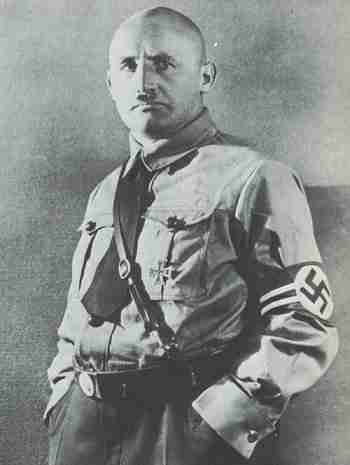
A Joke: It is said that a few weeks before Streicher's execution, a young American guard at Nuremberg noticed that the prisoner was busy studying English. When he asked Streicher why he was spending his last days learning a new language, Streicher replied that he had heard tell that English is the language spoken in Heaven. The guard, while expressing no opinion as to whether or not English is the language of choice in heaven, nevertheless did express some doubt that Streicher would ever find himself at the Pearly Gates. The guard inquired, "Suppose you go to the other place?" "That's OK," Streicher declared, "I already know how to speak French." [Note: I would not rely on such an anecdote. Streicher was unintelligent and there was no previous evidence of a sense of humor, as far as I know.—Ed.]
1893 Birth: Omar Bradley:
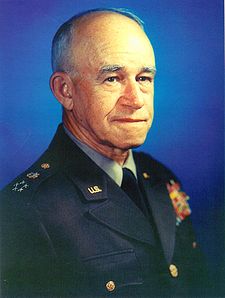
Omar Bradley was born . . . in Clark, Missouri. In 1915, he graduated from West Point. Under General George S. Patton, he captured Bizerte, Tunisia in 1943, which led to the surrender of more than 250,000 Axis troops. As a commander in World War II, he planned and participated in the Normandy Invasion. In 1949, he was named the first chairman of the Joint Chiefs of Staff. He died in 1981. (Biography.com.)
1912 China: Last emperor is forced to abdicate, following Sun Yat-Sen's republican revolution:
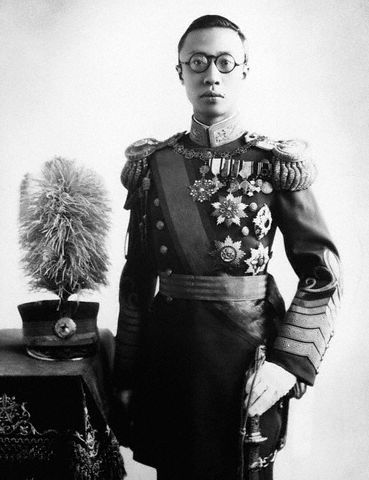
Puyi . . . , also called Henry Puyi, . . . (1906, 1967), last emperor (1908-1911/12) of the Qing (Manchu) dynasty (1644-1911/12) in China, and puppet emperor of the Japanese-controlled state of Manchukuo . . . from 1934 to 1945. Puyi succeeded to the Manchu throne at the age of three, when his uncle, the Guangxu emperor, died on Nov. 14, 1908. He reigned under a regency for three years, and then on Feb. 12, 1912, in response to the Republican Revolution of the previous year, he was forced to abdicate, ending the 267-year Qing rule of China and the 2,000-year-old imperial system. He was permitted to continue living in the palace in Beijing. Puyi chose Henry as a given name and was thereafter known as Henry Puyi in the West. In 1924 he secretly left Beijing to reside in the Japanese concession (colony) at Tianjin. On March 9, 1932, he was installed as president, and from 1934 to 1945 was emperor of the Japanese puppet state of Manchukuo in Manchuria (China's Northeast) under the reign title of Kangde. At the end of World War II he was taken prisoner by the Russians (August 1945) and returned to China for trial as a war criminal in 1950. He was pardoned in 1959 and went again to live in Beijing, where he first worked in the mechanical repair shop of a botanical garden and later became a researcher in the institute of literature and history under the Chinese People's Political Consultative Conference. His autobiography, From Emperor to Citizen was published in English in 1964-65, and he was the subject of the 1987 [biographical movie] The Last Emperor.
1915 World War I: British planes raid Belgian coast: One of the biggest air raids of World War I occurs on this day in 1915, when 34 planes from the British Naval Wing attack the German-occupied coastal towns of Blankenberghe, Ostend and Zeebrugge in Belgium. [For further information, click here]
1917 World War I: American schooner Lyman M. Law is sunk by the Austrian submarine U-35:
The Lyman M. Law, captained by S.W. McDonough, had embarked on its final journey from Stockton, Maine, with a crew of 10 on January 6, 1917, carrying a cargo of 60,000 bundles of lemon-box staves.
The schooner was traveling across the Atlantic bound for Palermo, Italy, when it was captured on the morning of February 12. The Austrians ordered the crew of eight Americans and two British sailors off the schooner before a bomb was detonated, setting fire to the 1,300-ton wooden vessel prior to its sinking. The crew [were] uninjured, and [were] transported to the coastal town of Cagliari, where they were released.
On February 26, 1917, President Woodrow Wilson referred to the unprovoked sinking of the Lyman M. Law and the February 3, 1917, sinking of the American steamship Housatonic by the German submarine U-53, in his request for Congressional authorization to arm U.S. merchant ships so that they could defend themselves against possible German attacks . . . . Wilson insisted repeatedly that the American people did not desire war, but merely sought to "defend our commerce and the lives of our people in the midst of the present trying circumstances".
1919 Various:
Weimar: Karl Radak
Poland and USSR: The very first clash between Polish forces and the Red Army takes place at Bereza Kartuska. Fifty-seven Polish soldiers and five officers attack Soviet forces in this small city to the east of Brzesc. They capture 80 soldiers of the Red Army.
1921 Various:
Soviet troops invade Georgia: According to Soviet sources, relations with Georgia deteriorated over alleged violations of the peace treaty, re-arrests of Georgian Bolsheviks, obstructiveness to the passage of convoys passing through to Armenia, and a strong suspicion that Georgia was aiding armed rebels.
1925 Estonia bans the communist Party.
1926 The League of Nations prepares to admit Germany, under the Locarno Treaty:
The German foreign minister Gustav Stresemann proposed that France, Germany, and Belgium should recognize as permanent their frontiers that was agreed at Versailles. This included the promise not to send German troops into the Rhineland and the acceptance that Alsace-Lorraine was permanently part of France. The French foreign minister, Aristide Briand, agreed with Stresemann's proposals and signed the treaty. However, as Germany refused to guarantee its eastern frontiers France sought to give Poland and Czechoslovakia [the] security they required by signing treaties with them. The Treaty of Locarno was signed in October 1925. This enabled Germany to be admitted to the League.
1927 China: The British expeditionary army lands in Shanghai:
Chiang Kai-shek wanted to prove that the Chinese could rule Shanghai and the country by themselves, rather than be exploited and dominated by foreign powers. His efforts to reclaim the crime-ridden city failed.
1931 Church and Party:
The eight Catholic bishops of Bavaria, organized in the Bavarian (Freising) Bishops Conference under the chairmanship of Cardinal Faulhaber, the Archbishop of Munich and Freising, strictly prohibits all Catholic priests from taking any part whatsoever in the National Socialist movement. Nazi party formations with flags are also prohibited from attending services "since such parades in churches would make the people think that the Church had come to terms with National Socialism." (THP)
1934 Austria: Dollfuss deploys the military against the Social-Democrats who control the capital of Vienna. Hundreds of men, women, and children, holed up in a municipally built housing complex, are massacred with artillery and machine guns. Dollfuss destroys the Socialists along with democracy in Austria, replacing it with a "Christian" dictatorship. [See: Austria: The Other Germany.]
From William L. Shirer's diary:
It's only a little more than a year ago that John Gunther and I had a long talk with him [Dollfuss] . . . . I found him a timid fellow, still a little dazed that he, the illegitimate son of a peasant, could have gone so far. But give the little men a lot of power and they can be dangerous. I weep for my Social-Democrat friends in Vienna, the most decent men and women I've known in Europe. How many of them are being slaughtered tonight? And there goes democracy in Austria, one more state gone. 1935 The great airship, USS Macon, crashes into the Pacific Ocean:
Crewmen hurried about the ship discharging anything they could do without to lighten the tail. But the Ship was doomed. After rising to nearly 5,000 feet, the Macon began to fall. Moments later it settled gently into the water. The crew, clad in life jackets and prepared with life rafts, jumped into the water safely. Ships were quickly on the scent to pull the men out. A radioman was killed when he jumped from the falling ship, and another man was lost when he apparently tried to retrieve his belongings. But in all, 81 of the 83 aboard the Macon survived the crash.
1936 Funeral: Wilhelm Gustloff (January 30, 1895‑‑February 4, 1936) was the founder and German leader of the Swiss NSDAP (Nazi) party. Gustloff, who worked as a Swiss government meteorologist put much effort in the distribution of the anti-Semitic book The Protocols of the Elders of Zion, to the point that members of the Swiss Jewish community sued the book's distributor, the Swiss Nazi Party, for libel. Gustloff was shot and killed in 1936 by David Frankfurter, a Jewish student incensed by Gustloff's anti-Semitic activism.
Hitler speaks at the funeral:
And now, on foreign soil, National Socialism has gained its first conscious martyr: a man who did nothing save to enter the lists for Germany which is not only his sacred right but his duty in this world; a man who did nothing save remember his homeland, and pledge himself to her in loyalty. He, too, was murdered, just like so many others. Even at the time when, on January 30, three years ago, we had come into power, precisely the same things happened in Germany, at Frankfurt on the Oder, at Koepenick, and again at Brunswick. The procedure was always the same: a few men come and call someone out of his house and then stab or shoot him down.
1938 Austria: Hitler meets with Austrian Chancellor Kurt Schuschnigg, his Foreign Minister Schmidt, Reich Foreign Minister Joachim von Ribbentrop, and Franz von Papen at Berchtesgaden. The German Fuehrer demands that Schuschnigg lift the ban on political parties, reinstate full party freedoms, release all imprisoned members of the Nazi party and allow them to participate in the government. On the morning of February 12, 1938, Schuschnigg, persuaded by Papen, motored across the border to Berchtesgaden. Hitler had only a vague conception of what would be discussed or what we would demand--to a large extent that depended on Schuschnigg's character and his reaction to Hitler. Never asking Schuschnigg to sit down, Hitler plunged into a series of tantrums: "Herr Schuschnigg, I say to you, Austria did in the whole of its history nothing other than to oppose German aims. That was the task of the Hapsburgs, that was the task of the Catholic Church, and it is the task of your government. We have only difficulties with Austria. Austria is our enemy." 1940 Holocaust: The first forced deportations of German Jews take place. (THP)
1941 World War II: Various:
On this day, German General Erwin Rommel arrives in Tripoli, Libya, with the newly formed Afrika Korps, to reinforce the beleaguered Italians' position.
In January 1941, Adolf Hitler established the Afrika Korps for the explicit purpose of helping his Italian Axis partner maintain territorial gains in North Africa . . . . The British had been delivering devastating blows to the Italians; in three months they pushed the Italians out of Egypt while wounding or killing 20,000 Italian soldiers and taking another 130,000 prisoner.
Having commanded a panzer division in Germany's successful French and Low Countries' campaigns, General Rommel was dispatched to Libya along with the new Afrika Korps to take control of the deteriorating situation . . . . Rommel was meant to command only his Afrika Korps and an Italian corps in Libya, but he wound up running the entire North African campaign. [See: The Mediterranean Strategy.]
Rommel: In view of the tenseness of the situation, and the sluggishness of the Italian command, I decided to ignore my orders and to take command at the front with my own hands as soon as possible.
USSR: General Georgi Zhukov is appointed Chief of the Soviet General Staff and Deputy Commissar for Defense.
Fritz Todt: Hitler speaks at the funeral:
"The German Reich's auto roads are, in the planning of their layout and the execution, the work of this quite unique technical, and in addition, also artistic, talent. We can no longer think of the German Reich without these roads."
Death: Avraham Stern:
Stern was born in 1907, in a part of eastern Poland then in Russian hands. In 1925, he immigrated to British Palestine and became an adherent of Revisionist Zionism‑‑a maximalist strain of the fermenting Jewish homeland movement:
Various threads and factions within the Zionist movement pursued different territorial and political goals with different strategies; Stern was among the most militant foes of anything with the whiff of collaboration with the British. When the armed underground movement known as The Irgun opted in 1940 to suspend attacks against British targets during World War II, Stern created a splinter organization with a programme of continuing anti-British violence.
The "Stern gang," as [the] imperial authorities knew it, had its reasons, controversial enough that some more moderate Jewish elements were happy to help the British hunt it, but reasons with their own logic, premised on the notion that London was the fundamental enemy of Jewish national interests while Berlin, for all its anti-Semitism, was not.
Between those two lay the room for wartime collaboration with Hitler against Britain with the object of establishing a Jewish state in the Levant open to unlimited immigration from a Reich eager to be rid of its Jews. In one fell swoop, it would solve Germany's "Jewish question," realize Zionist state-building aspirations, and disrupt the Nazis' wartime enemy. Stern, who had cultivated an affinity for fascism while studying in Italy, and [had] pitched a similar bargain to Mussolini, offered a pact with the Devil: "the establishment of the historic Jewish state on a national and totalitarian basis, bound by a treaty with the German Reich."
Berlin never took up the offer. Stern himself would have only a year to live, and his tiny splinter group didn't get very far off the ground during it, carrying out a few murders and trying to raise money through crime. A high-profile bank robbery in January of 1942 that left several [Britons] and Jews dead brought down an intense manhunt that caught up with Stern on this day. He was handcuffed and shot on the spot.
His organization would come into its own after his death under leadership that included future Likud Prime Minister Yitzhak Shamir, carrying out a number of assassinations in the mid-40′s as Palestine slid towards the civil war that would give birth to Israel. In that incarnation, it valorized its creator.
1943 Various:
World War II: Churchill to Stalin: (Regarding) your message of January 30th . . . . There are a quarter of a million Germans and Italians in Eastern Tunisia. We hope to destroy or expel these during April, if not earlier. When this is accomplished, we intend in July, or earlier if possible, to seize Sicily with the object of clearing the Mediterranean, promoting Italian collapse with the consequent effect on Greece and Yugoslavia and wearing down of the German Air Force; this is to be closely followed by an operation in the Eastern Mediterranean, probably against the Dodecanese . . . . We are also pushing preparations to the limit of our resources for a cross-Channel operation in August, in which British and United States units would participate . . . . Both operations will be supported by very large British and American air forces, and that across the Channel by the whole metropolitan Air Force of Great Britain.
Reich labor: From a meeting of the Military Commanders and all responsible officials of the Reich labor service: Gauleiter Fritz Sauckel likewise thanks the various services for the successful carrying out of the first action. Immediately after the beginning of the new year, he is obliged to announce further severe measures.
There is a great new need of labor for the front as well as for the Reich armament industry . . . . The situation at the front calls for 700,000 soldiers fit for front-line service. The armament industry would have to lose 200,000 key workers by the middle of March. I have received an order from the Fuehrer to find 200,000 foreign skilled workers as replacements and I shall need for this purpose 150,000 French skilled workmen, while the other 50,000 can be drawn from Holland, Belgium, and other occupied countries.
In addition, 100,000 unskilled French workers are necessary for the Reich. The second action of recruitment in France makes it necessary that by the middle of March 150,000 skilled workers and 100,000 unskilled workmen and women be transferred to Germany.
1945 Various:
Holocaust:
However solid evidence of Verschuer's willing collaboration could not be established, much to the disappointment of the principal post-war Allied investigator, Leo Alexander, assigned to his case. In a letter to his wife from 1946, Alexander wrote:
It sometimes seems as if the Nazis had taken special pains in making practically every nightmare come true. Some new evidence has come in where two doctors in Berlin, one a man and the other a woman, collected eyes of different colour. It seems that the concentration camps were combed for people whose one eye had a slightly different color than the other. [Whoever] was unlucky enough to possess such a pair of slightly unequal eyes had them cut out and was killed, the eyes being sent to Berlin. This is the carrying out into reality of an old gruesome German fairy tale which is included in the Tales of Hoffmann, where Dr Coppelius posing as a sandman comes at night and cuts out children's eyes when they are tired. The grim part of the story is that Doctors von Verschuer and Magnussen in Berlin did prefer children and particularly twins. There is no end to this nightmare.
UN Conference: San Francisco is selected as the venue. Yalta Conference: After the conclusion of the Conference the day before, FDR leaves the Crimea for Egypt aboard the Sacred Cow, an early version of Air Force One. (Harriman) 1946 Nuremberg Tribunal: [Yesterday] the Russians continued to present thier case and late in the day they rather dramatically presented the German Field Marshal von Paulus, whom they captured at Stalingrad. He denounced Hitler, the Nazis, and the defendants. However, his story struck me as being just a bit too well rehearsed. The German defense lawyers cross-examined von Paulus and did quite a good job of it.
Field Marshal Paulus is cross-examined by defense counsel—whose clients are hostile, to a man, against [Paulus]. Dr Sauter (Counsel for Defendants Baldur von Schirach and Walter Funk): Another question. After Stalingrad was encircled and the situation had become hopeless, there were several telegrams of devotion sent to Hitler from inside the fortress. Do you know anything about that? Paulus: If I judge correctly, then I believe that I am supposed to be here as a witness for the events with which the defendants are charged. I ask the Tribunal, therefore, to relieve me of the responsibility of answering these questions which are directed against myself. 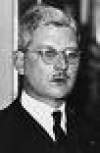
Creating an atmosphere of intimidation, Hitler refused to negociate at all but had Ribbentrop and a representative of the Austrian Nazis work out the terms to be presented to Schuschnigg. Taking a leaf from the Allies' diplomacy at Versailles, Hitler presented these to Schuschnigg on an "accept-them-or-else" basis. What the "else" would be was left to Schuschnigg's imagination, though Germany, which still had only one far-from-battle-ready armored division, was in no shape militarily to precipitate an international crisis. Losing his nerve, Schuschnigg agreed to the terms. 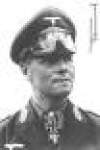
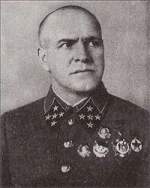
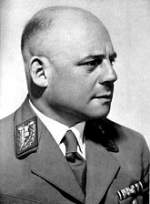
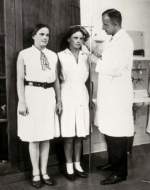
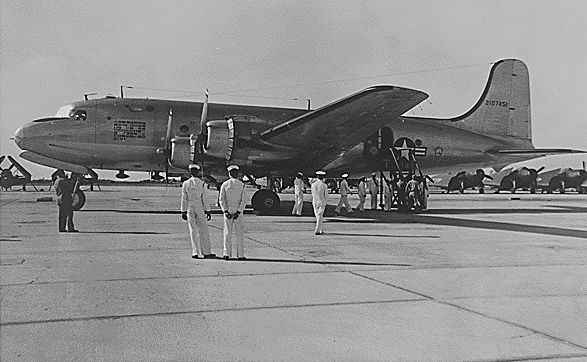

Paulus: If you speak of telegrams of devotion, I only know about the end, when efforts were made to find a meaning for the catastrophe that had happened there, to find a meaning for all the suffering and dying of so many soldiers. Therefore these things had been depicted as heroism in the telegram, to be forever remembered. I am sorry, but at that time, due to the prevailing situation, I let that pass and did not stop it.
Dr Sauter: These telegrams were yours, were they not?
Paulus: I do not know to which telegrams you are referring, with the exception of the last one. Dr Sauter: Several telegrams of devotion, in which there was a promise to hold out to the last man; those telegrams about which the German people were horrified. They are said to have your signature.
Paulus: I request to have them presented to me, because there is nothing known to me about them.
Dr Sauter: Do you have any idea what was in the last telegram?
Paulus: In the last telegram there was a short description of what the army had done, of the achievement of the army, and it was pointed out that it did not intend to capitulate, and that that should be an example for the future.
Dr Sauter: The answer was, I think, your promotion to General Field Marshal?
Paulus: I do not know that this was the answer.
Dr Sauter: But you were promoted to General Field Marshal, and you still have that title because the statement which I have submitted to the Court is signed "Paulus, General Field Marshal."
Paulus: Well, I have to say . . . Do you mean this statement?
Dr Sauter: Yes, this statement.
Paulus: Yes, I had to take that title which was conferred upon me.
Dr. Nelte: Field Marshal Paulus, you do not seem to know that you also belong to the circle of the defendants, because you belonged to the organization of the High Command which is indicted here as criminal.
Paulus: And, therefore, since I believe that I am here as witness for the events which have led to the indictment of these defendants here, I have asked to be relieved of answering this question which concerns myself.
Dr. Nelte: I ask the Tribunal to decide.
The President: The Tribunal considers that you must answer the questions. [Note: Such is the usual fate of the traitor.]
Reaction: Goering, scornful of Paulus' reluctance to incriminate himself, comments on his selective memory: "He doesn't remember--Hess, do you know that you've got a competitor? The witness doesn't remember. (Laughing) Why, he was the expert on Russian troop strength." (Taylor)

1955 Wunderwaffen: The Soviet government establishes the Baikonur Cosmodrome--the Soviet version of Cape Canaveral--in the Kyzylorda Province of Kazakhstan. [See: Wunderwaffen: Hitler's Deception and the History of Rocketry.]
1986 Soviet Jewry: Scharansky released: After spending eight years in Soviet prisons and labor camps, human rights activist Anatoly Scharansky is released. The amnesty deal was arranged by Soviet leader Mikhail Gorbachev and U.S. President Ronald Reagan at a summit meeting three months earlier.
Scharansky was imprisoned for his campaign to win the right for Russian Jews, officially forbidden to practice Judaism, to emigrate from the USSR. Convicted of treason and agitation, Soviet authorities also labeled him an American spy. After his release, he immigrated to Israel, where he was given a hero's welcome. Later, as a member of Israel's parliament, he was an outspoken defender of Russian Jews.
1988 Cold War: Russian ships bump U.S. destroyer and cruiser:
Two Soviet warships bump two U.S. navy vessels in waters claimed by the Soviet Union. The incident was an indication that even though the Cold War was slowly coming to a close, old tensions and animosities remained unabated.
The incident between the ships took place in the Black Sea, off the Crimean peninsula. The American destroyer Caron and cruiser Yorktown were operating within the 12-mile territorial limit claimed by the Soviet Union. They were challenged by a Soviet frigate and destroyer and told to leave the waters. Then, according to a Navy spokesman, the Soviet ships "shouldered" the U.S. ships out of the way, bumping them slightly. There was no exchange of gunfire, and the American ships eventually departed from the area. There was no serious damage to either U.S. vessel or any injuries. [For further information, click here]
2002 Milosevic goes on trial for war crimes:
On this day in 2002, former Yugoslav president Slobodan Milosevic goes on trial at The Hague, Netherlands, on charges of genocide and war crimes in Bosnia, Croatia and Kosovo. Milosevic served as his own attorney for much of the prolonged trial, which ended without a verdict when the so-called "Butcher of the Balkans" was found dead at age 64 from an apparent heart attack in his prison cell on March 11, 2006. [For further information, click here]
Edited by Levi Bookin (Copy editor) Click to join 3rdReichStudies Disclaimer: This site includes diverse and controversial materials--such as excerpts from the writings of racists and anti-Semites--so that its readers can learn the nature and extent of hate and anti-Semitic discourse. It is our sincere belief that only the informed citizen can prevail over the ignorance of Racialist "thought." Far from approving these writings, this site condemns racism in all of its forms and manifestations.
levi.bookin@gmail.com










Fair Use Notice: This site may contain copyrighted material the use of which has not always been specifically authorized by the copyright owner. We are making such material available in our efforts to advance understanding of historical, political, human rights, economic, democracy, scientific, environmental, and social justice issues, etc. We believe this constitutes a "fair use" of any such copyrighted material as provided for in section 107 of the US Copyright Law. In accordance with Title 17 U.S.C. Section 107, the material on this site is distributed without profit to those who have expressed a prior interest in receiving the included information for research and educational purposes. If you wish to use copyrighted material from this site for purposes of your own that go beyond 'fair use', you must obtain permission from the copyright owner.
Please Note: The list-owner and the moderator of 3rdReichStudies are not responsible for, and do not necessarily approve of, the random ads placed on our pages by our web server. They are the unfortunate price one pays for a 'free' website.